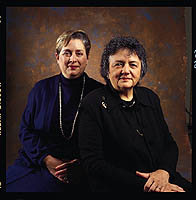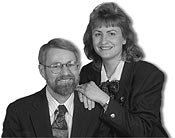![]()
Vol. 71, No. 3, March
1998
Mentoring: Reaching Out, Giving Back
By Diane Molvig
When Susan Rosenberg was a first-year law student back in 1981, she was
invited to shadow Wisconsin Supreme Court Justice Shirley Abrahamson for
a day. Understandably, Rosenberg was a bit overwhelmed by the experience.
At the end of the day, she sat down across the desk from Abrahamson and
posed a couple of questions. "I asked, 'Why are you doing this? How
can you afford to spend an entire day with me?,'" Rosenberg recalls.
"She looked at me and said, 'Because I'm investing in the future. Someday
you'll do this for someone else.'"

Wisconsin Supreme Court Chief Justice Shirley Abrahamson
invested in the profession's future when she became Susan Rosenberg's mentor
in 1981. Today, Rosenberg often finds herself on the other side of the desk,
offering guidance or sharing insights to other lawyers, whether in her capacity
as an experienced lawyer or as president of the Milwaukee-based Association
for Women Lawyers.
Photo: Steve Milanowski Harper/Fritsch Studios |
True to Abrahamson's prediction, today Rosenberg often finds herself
on the other side of the desk, offering guidance or sharing insights, whether
in her capacity as an experienced lawyer or as president of the Milwaukee-based
Association for Women Lawyers, one of the professional
organizations in Wisconsin that actively fosters mentoring among attorneys.
The concept of investing in the future, as Abrahamson put it, is at the
core of what mentoring is about. A mentor is "an experienced and
trusted friend and adviser," according to Webster's. Some would include
additional roles: counselor, guide, confidant or teacher. Whatever the combination
may be, mentoring involves the more experienced reaching out to the less
experienced. The connection might last for a day or several years.
"The idea is to help new lawyers and law students to understand
what they need to know to be not only successful, but also comfortable in
the profession," says Margadette Demet, who chaired the Bridge the
Gap Committee that created the State Bar's Mentor Program in 1991. "I
see mentoring as very important because we have glamorized some professions
so much without giving students a picture of what it's really like out there."
Where do new Wisconsin lawyers, or lawyers-to-be, find their mentors?
Some link up through formal programs, while others find mentors on their
own. Whatever the derivation of the relationship, "mentoring is not
hand-holding, it's hands on," points out Milwaukee attorney Leonard
Loeb, who was a key force behind founding the Wisconsin chapters of the
American Inns of Court, another mentoring organization. "New lawyers
need access to senior lawyers, so that they don't feel adrift ... and believe
it or not, it's a two-way street. When you teach, you learn more than you
teach."
A sense of camaraderie
Years ago, mentoring in the legal profession happened naturally, says
Milwaukee attorney John DeStefanis. In 1975, right out of law school, he
and a former classmate set up their practice in a downtown Milwaukee office
building that housed a number of lawyers. "They all mentored us,"
DeStefanis says. "We got advice and forms, used their books. In those
days, a young lawyer could almost always approach an older lawyer and be
warmly received, in my experience. I've never forgotten that, and I think
that's one of the reasons I was motivated to become part of the State Bar's
Mentor Program."
Such programs are vital in today's environment, says DeStefanis. "When
I started practicing 22 years ago, I think there was more collegiality among
lawyers," he explains. "That's not to say that older lawyers are
not receptive to younger lawyers today. But because of the increased competition
and the pressure to get billable hours and to use time productively, I think
a lot of younger lawyers might be afraid to approach an older lawyer."
"When you approach a stranger and say, 'I'm a lawyer, too,' you're
not certain there's a willingness to talk to you," agrees Milwaukee
attorney Heidi Szatmary, one of DeStefanis's mentees. "So you feel
uncomfortable. But the mentoring relationship fosters a sense of camaraderie,
of sharing in a community, so that we're all getting better as lawyers."
Szatmary, who's been out of law school for two years, calls on DeStefanis
for advice on legal questions or career direction. They both share an interest
in pro bono work, "so he's been able to point me to resources or suggest
ideas for my pro bono work that I might not have known about because I'm
just getting my feet wet," Szatmary says.
Rod Rogahn, DeStefanis's other mentee, has been out of law school slightly
more than a year. Besides his connection with DeStefanis, Rogahn also receives
mentoring within his law firm, which many of his young colleagues aren't
fortunate enough to have, he points out. "I know some who are in practice
with others, but they don't necessarily feel they have someone to turn to,"
Rogahn says. "It's like that old adage about being in a marriage, but
still feeling alone."
Rogahn turns to DeStefanis for input about cases or legal issues. "It's
not as though I expect a direct answer," Rogahn says. "But he'll
give me a sense of it and tell me where to go to find specific answers."
Having a mentor is "like having an old friend out there," Rogahn
adds. "And that helps your confidence, too."
Survival skills training
Confidence building also has been a key benefit for Madison attorney
Anne Applegate-Scott in her mentoring relationship with Tom Dixon, director
of training and development for the State Public

Anne Ertel-Sawasky found her mentor, Appleton attorney
Ken Podell, constantly challenging her; equally important, Podell let Ertel-Sawasky
challenge him. She felt free to ask why, to push him to explain his position
and to let him know when she didn't agree. "I think he viewed it as
good for my development, to hone my legal thinking, and good for him because
I might think of something he'd overlooked. |
Defender's office. She remembers an episode a few years ago when she took
a private bar assignment from the SPD that seemed headed to a jury trial.
She had never done a jury trial before. "So I called Tom one Saturday,"
she recalls, "and asked if I could pick his brain for an hour."
The hour stretched to three hours, during which "he showed me no
signs of flagging interest," Applegate-Scott says. Dixon coached her
on how to cross-examine police officers, how to get the best information
from her witnesses, and what to do in response to the defense attorney's
tactics. "I got my trial in miniature right there in his dining room,"
she says. "That kind of help is just invaluable. It gave me not only
information but the confidence to represent my client well."
That was one occasion out of many when Applegate-Scott has turned to
her mentor for advice and not only about the law per se. She also
looks to Dixon for guidance on "how to be a whole person and practice
law at the same time," she says. The two first got to know each other
about four years ago, when she was a law student volunteering at the Wisconsin
Coalition for Advocacy, where he was a staff attorney.
Because Dixon has been there for her, Applegate-Scott says she's "survived
with minimal scars a lot of situations that I think would have devastated
other young lawyers." What's more, the relationship has "evolved
into a very nice friendship," adds Applegate-Scott, who just had her
first child. "Tom recently made a joke to an acquaintance of mine that
he was looking forward to being a vicarious grandfather. But I think of
him more like a big brother."
Like Applegate-Scott, Oshkosh attorney Alyson Zierdt believes mentors
can be instrumental in getting new lawyers through some of the early tests
and traumas. "You'd probably find your way eventually," she points
out, "but I think it would be harder and take longer."
Zierdt names Milwaukee lawyer Michael Wherry as the primary mentor in
her career. They met through local bar functions very early in her career.
"He recommended me for a committee," Zierdt recalls, "and
encouraged me, as a professional colleague, to get involved in bar activities."
A few years later, Zierdt went to work at Wherry's firm, and he was designated
as her official in-house mentor. "The big thing I found so valuable,"
Zierdt says, "was that I never felt like we were anything other than
peers. And of course we weren't peers. He'd been in practice for 20-some
years; I'd been in practice for five years. But he never made me feel like
I was a new, dumb lawyer who didn't know what I was doing. He respected
my opinion, and we had a lot of lively debates because I didn't always agree
with his opinion."
Wherry saw to it that Zierdt got work assignments that helped her polish
her skills and grow as a lawyer. But it amounted to more than being a helpful
boss or coworker. As a mentor, Wherry was "someone I could count on
to be an advocate for me in the firm," Zierdt says. "The other
thing Mike did for me was to make me believe that I could be as good a lawyer
as he."
Now that Zierdt is practicing in Oshkosh and Wherry is in Milwaukee,
they don't have as frequent contact as they did when they were down the
hall from each other. But they remain in touch by phone and get together
whenever they land in the same city. Still, Zierdt says she doesn't call
on Wherry for advice as much as she used to. And perhaps that's for the
best, she adds. One of the essential truths about mentoring is that eventually
the relationship has to move on.
"As long as your mentor is there, it's kind of your crutch,"
Zierdt explains. "You always know you have that cushion behind you,
and you second-guess yourself. In the back of my mind was always the thought
that Mike would give me work. I didn't feel the pressure to be my own rainmaker.
Coming in here (the Oshkosh firm), I walked into the proverbial clean slate.
I've had to build a litigation practice from scratch, and I've been amazed
at my own skills."
"When I was getting ready to leave Davis and Kuelthau (her former
Milwaukee firm)," Zierdt adds, "one of the secretaries said to
me, 'Now you're going to be Mike Wherry.' I thought it was funny, but true
in a way, too."
Next Page
|
